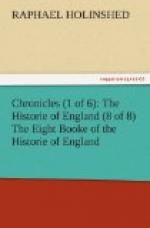After that Robert the archbishop of Canturburie, was departed the [Sidenote: Stigand archbishop of Canturburie.] realme, as before ye haue heard, Stigand was made archbishop of Canturburie, or rather thrust himselfe into that dignitie, not being lawfullie called, in like manner as he had doone at Winchester: for whereas he was first bishop of Shireborne, he left that church, and tooke vpon him the bishoprike of Winchester by force, and now atteining to be archbishop of Canturburie, he kept both Winchester [Sidenote: Ranul. Hig. Fabian. Stigand infamed of simonie.] and Canturburie in his hand at one instant. This Stigand was greatlie infamed for his couetous practises in sale of possessions apperteining to the church. He was nothing learned: but that want was a common fault amongest the bishops of that age, for it was openlie spoken [Sidenote: What maner of men meet to be bishops in those daies.] in those daies, that he was meet onelie to be a bishop, which could vse the pompe of the world, voluptuous pleasures, rich raiment, and set himselfe foorth with a iollie retinue of gentlemen and seruants on horsse-backe, for therein stood the countenance of a bishop, as the world then went; and not in studie how to haue the people fed with the word of life, to the sauing of their soules.
King Edward now in the twelfth yeare of his reigne, hauing brought [Sidenote: Polydor.] the state of the realme quite from troubles of warre both by sea and land, began to foresee as well for the welth of his subiects, as for himselfe, being naturallie inclined to wish well to all men. He therefore considered, how by the manifold lawes which had beene made by Britaines, Englishmen and Danes within this land, occasion was ministred to manie, which measured all things by respect of their owne priuate gaine and profit, to peruert iustice, and to vse wrongfull dealing in stead of right, clouding the same vnder some branch of the lawe naughtilie misconstrued. Wherevpon to auoid that mischiefe, he picked out a summe of that huge and vnmesurable masse and heape of lawes, such as were thought most indifferent and necessarie, & therewith ordeined a few, & those most wholesome, to be from thenceforth vsed; according to whose prescript, men might liue in due forme and rightfull order of [Sidenote: The lawes of S. Edward instituted.] a ciuill life. These lawes were afterwards called the common lawes, and also saint Edward his lawes; so much esteemed of the Englishmen, that after the conquest, when the Normans oftentimes went about to abrogate the same, there chanced no small mutinies and rebellions for retaining of those lawes. But heere is to be noted, that although they were called saint Edwards lawes, they were for the more part made by king Edgar; but now by king Edward restored, after they had bin abrogated for a time by the Danes.




